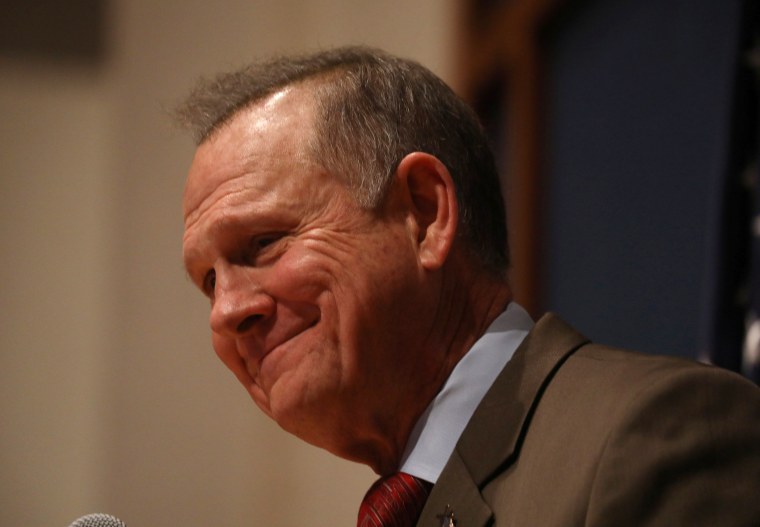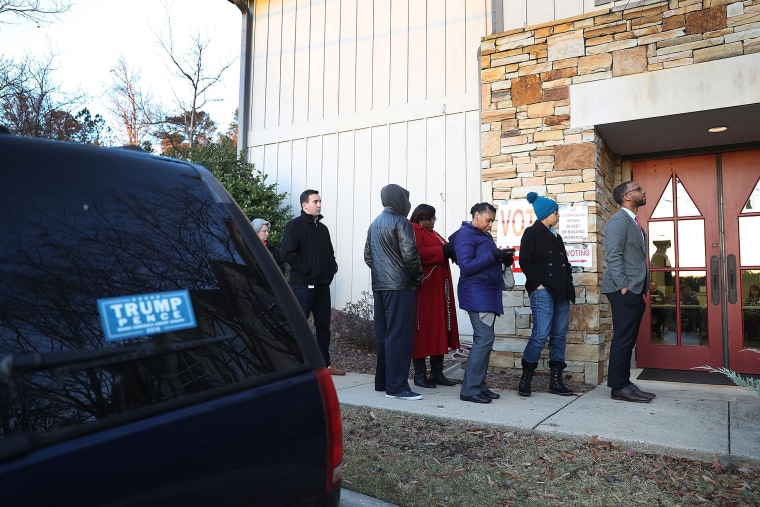From the president’s persistent claim that he would have won the popular vote in November 2016 but for “millions of people who voted illegally” to Senate candidate Roy Moore’s frivolous late-night filing in state court alleging “systematic voter fraud” and pleading that “a new special election be held,” Republican politicians are increasingly aiming to undermine elections’ credibility by denigrating and criminalizing black and Latino voters who cast their ballots for Democrats.
This unwillingness by some to accept electoral results when minority voters play a large role represents a disturbing effort to delegitimize the outcome of free and fair elections.

It’s no coincidence, for instance, that Moore’s suit cited Jefferson County, 43 percent African-American, and claimed — based on dubious statistical analysis — that turnout was “suspiciously high” and therefore “confirmed election fraud.” Such racially charged claims of voter fraud, aimed mostly at black voters in Southern states and at Latino voters elsewhere, reflect a right-wing populism that views high non-white turnout as itself a kind of injustice that undermines the political will of “real” voters.
In a recent essay on Trump and the rise of populist politics, political theorist Jan-Werner Müller argued that one of the most disturbing aspects of the populist mindset is proponents’ claim that “they and they alone” speak in the name of what they tend to call the “real people,” and that people with whom they disagree politically are simply less entitled to exercise the franchise. Moore’s and Trump’s apparent belief that their supporters, and only their supporters, constitute the “authentic” American people is right-wing populism in a nutshell.
We saw this logic in the five-minute video Moore released the day after losing which took aim at pro-choice voters, immigrants, and LGBT people whom he characterized as an existential threat to the nation’s political future. “We have become slaves to their tyranny,” he said.
Moore’s actions, like Trump’s, teach voters to view those who cast ballots for rival candidates not as fellow citizens of a shared democracy but as immoral and illegitimate “takers” who need to be defeated.
Then, despite Alabama’s secretary of state telling reporters that his office had received no credible evidence of voter fraud, Moore supporters spread rumors that the Jones campaign had bused in black residents from other states, that multiple people had tried to vote using fake IDs, and that a “van full of illegals” — Hispanic men with fake identification — traveled to at least seven polling locations, voting multiple times.
Moore could have helped his supporters see his campaign as a fair but hard-fought battle between fellow citizens; instead, he encouraged them to see the election as “rigged,” and to see themselves not as citizens of a nation with a shared commitment to the rule of law but as victims of a corrupt system that denies justice to the righteous and uses nonwhites and noncitizens to install fraudulent representatives.
Moore’s actions, like Trump’s, teach voters to view those who cast ballots for rival candidates not as fellow citizens of a shared democracy but as immoral and illegitimate “takers” who need to be defeated — enemies of civilization who need to be crushed.
Racially charged claims of voter fraud, aimed mostly at black voters in Southern states and at Latino voters elsewhere, reflect a right-wing populism that views high non-white turnout as itself a kind of injustice.
The United States does, of course, have a history of rigged elections: Poll taxes, literacy and language tests, and byzantine election rules are all part of a shameful legacy of white political domination that was bipartisan in nature and worked to limit the electoral power of poor, immigrant and nonwhite citizens. Corrupting and subverting the democratic process have never been blacks and Latinos “illegally” voting, much less ACORN, George Soros or any other boogeymen. Scholar-activists such as Ida B. Wells, W.E.B. Du Bois, Arnoldo de León and Carey McWilliams have chronicled the history of white citizens rioting, lynching and terrorizing blacks and Mexicans in the South and Southwest when they tried to claim and use the franchise.
Today, baseless assertions of fraud, given a veneer of legitimacy by the likes of Kris Kobach’s federal voter-fraud commission, take us back to that ugly and violent history. Roy Moore’s pugnacious stubbornness to accept the results of the election may fire up his supporters, but it does lasting damage to the fabric of our nation.
Cristina Beltrán is an associate professor in the departments of Politics and Social & Cultural Analysis at New York University. She is the author of “The Trouble with Unity: Latino Politics and the Creation of Identity” (Oxford University Press, 2010).
